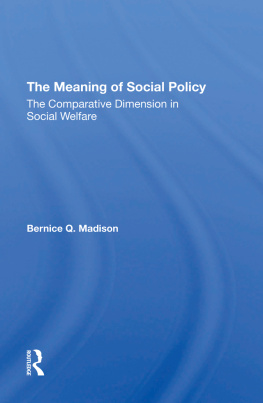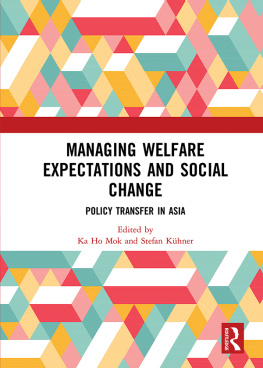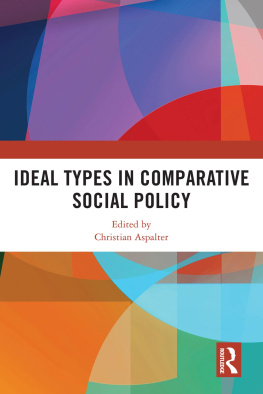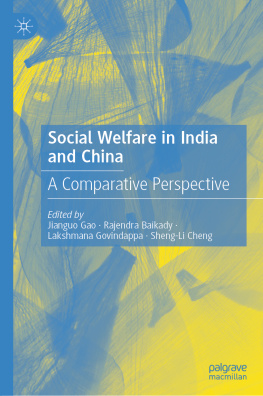First published 1980 by Westview Press
Published 2019 by Routledge
52 Vanderbilt Avenue, New York, NY 10017
2 Park Square, Milton Park, Abingdon, Oxon OX14 4RN
Routledge is an imprint of the Taylor & Francis Group, an informa business
Copyright 1980 Bernice Q. Madison
All rights reserved. No part of this book may be reprinted or reproduced or utilised in any form or by any electronic, mechanical, or other means, now known or hereafter invented, including photocopying and recording, or in any information storage or retrieval system, without permission in writing from the publishers.
Notice:
Product or corporate names may be trademarks or registered trademarks, and are used only for identification and explanation without intent to infringe.
British Library Cataloguing in Publication Data
Madison, Bernice Q.
The meaning of social policy.
1. Social policy Comparative method
I. Title
361 HN17.5
ISBN 0-7099-0222-0
LC Card No: 79-3622
ISBN 13: 978-0-367-29380-2 (hbk)
I would like to thank Michael S. Lund for sending me his unpublished manuscript entitled 'Comparing the Social Policies of Nations: A Report on Issues, Methods, and Resources. Part I: A Review of the Literature', Draft No. 2, March 1972. This work added a few items to my bibliography and in several instances enriched my understanding of what was found in the literature.
I am especially grateful to the Woodrow Wilson International Center for Scholars in whose Kennan Institute for Advanced Russian Studies I spent the year 1977/8 as a fellow. This period of concentrated research, devoted to a comparison of social welfare in the Soviet Union and the United States, measurably strengthened my grasp of welfare policy issues in the two superpowers, and also renewed my interest in social welfare policy and planning in an international perspective.
The importance of a cross-national approach to social welfare policy and planning is currently achieving growing recognition among social welfare scholars, administrators and practitioners and is being widely used by social scientists as they become more aware of the limitations of their own 'national' frames of reference,:23). The International Labour Conference adopted a resolution on the need for developing internationally comparable statistics on social security in 1944 (at its 26th session). Behind this spreading and intensified interest in comparative studies and international perspectives in the social welfare field are both theoretical and practical considerations.
At the theoretical level, comparative studies are among the better instruments for establishing general laws about social life for searching out the theoretically relevant similarities. Clear of irrelevant specifics, such laws transcend cultural and national settings and reveal whether what is found 'to be true in one society is a phenomenon that occurs under a given set of circumstances in all societies or whether it is relevant for that society only' (:834) can help us understand causal relationships. When comparative studies shed light on the similarities and differences between the social institutions of two or more nations, they often reveal the causal links within each nation.
By comparing and contrasting public expenditures of many nations, Pryor was able to discover
relationships which, for lack of perspective, can never be unearthed from study of such expenditures in a single country. If nations with different economic systems are used in such comparisons, additional generalizations with political and ideological significance can be derived which are unobtainable if we limit such comparison to nations with the same economic system (:1920).
:74).
At a practical level, comparative studies make possible the detection of trends and the placing of a given system in clearer perspective, thereby contributing to a better understanding of the social policies of particular countries. Nations can draw upon the experience of others if methods of dealing with certain problems 'prove "exportable" '(:13). Experts and policy-makers in different countries can make their experience more understandable and useful to each other, and prepare themselves better for intelligent international cooperation. The perspective gained through cross-national research helps to avoid the 'here and now' view which repeats previous mistakes and relies on a pseudo-inventiveness that ignores the experience of others. In short, it can help policy-makers decide what not to do, as well as what to do.
To what extent cross-national studies can be used for predictive purposes has been of concern for some time. Writing in 1966 as the editor of the influential book Social Indicators , Bauer explained that he deliberately used the word anticipation of the future instead of the more popular term prediction because he wanted
to avoid certain prevailing errors in thinking about the future as a guide to action. For example, prediction ordinarily is thought of as identifying that future state of affairs which is considered to be the most probable of all the conceivable outcomes. However, a program of action must contemplate more possible states of affairs than solely that one which appears to be the most probable. It must take into consideration a whole range of events which are reasonably probable and reasonably important. For this reason, we prefer the broader concept of anticipation to that of prediction, which has come to imply concern with the single most probable future event among all those that are possible (:17).
The predictive potential of comparative studies remains a moot point. While some social scientists think that social forecasting is feasible, they note that methodology for it is as yet in an underdeveloped state; in an international perspective the situation is complicated by the problem of transferability of social phenomena to different environments. Nevertheless, there is a growing conviction that the predictability of certain choices can be better assessed when evidence from more than one country is available. And Mouton points out that 'at a more modest level' comparative studies can 'try to discern some of the broad lines of future developments, bearing in mind present trends, the underlying factors which can also affect future prospects, and the possible solutions to problems [uncovered by them]' (:15960).
The helping professions in all societies - especially those concerned with health, education and welfare attach great importance to experiential learning considered essential for acquiring therapeutic skills as well as for enhancing the professional's capacity to act as a change agent in societal evolution to contribute effectively to policy and planning. If one agrees with Titmuss that
It is only when one adopts a comparative approach and analysis that one can distinguish something of the nature of the real choices and priorities in social policy which, in the ultimate, is all about the dilemmas of choice and change, individual liberty and collective responsibility (:102-3),
then it becomes obvious that helping professionals can gain a great deal, indeed, from comparative studies of social welfare policy and an international view of social welfare planning.












